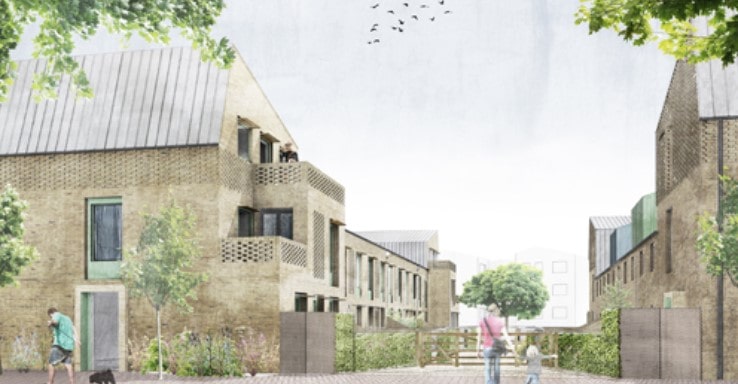Sector - Finance & Legislation
How will the housing crisis be handled after the election?
22 Nov 19

Britain is in the midst of a housing crisis and, with a General Election looming on the 12th December, many housing providers are keen to hear what each prospective government’s solution will be.
Now that the election is less than one month away, political parties have begun sharing their manifestos and their policies on how best to tackle the issues of the nation.
The Labour Party Manifesto
Council housing and affordable homes have been identified as a key area of importance by the Labour Party, with their recently published Party Manifesto highlighting a key promise, to spend half of their Social Transformation Fund on housing.
Specifically, the manifesto states that Labour will spend a total sum of £75Bn over the course of a five year period on housing, increasing the number of council houses built each year to 100,000 by the end of parliament, highlighting the Goldsmith Street development in Norwich as an example of what the party hopes to achieve. The promise will see the biggest council housinjg programme since WWII.
The Leader of the Labour Party, Jeremy Corbyn stated: “Housing should be for the many, not a speculation opportunity for dodgy landlords and the wealthy few.
“I am determined to create a society where working class communities and young people have access to affordable, good quality council, and social homes.”
The Labour Shadow Housing Secretary, John Healey added: “The next Labour Government will kick-start a housing revolution, with the biggest investment in new council and social homes this country has seen for decades.
“Our modern council and social housing will be built to cutting-edge design and green standards providing a long-term investment in our country’s future.”
These pledges by the Labour Party contrast with the housing pledges made by the Conservative Government which has targeted the construction of 300,000 homes per year by the mid-2020s, though they have not specified what proportion of the 300,000 will comprise affordable housing.
The Conservative Government’s housing targets
As mentioned previously, the Conservative Government has previously pledged to delivery a total of 300,000 homes per year by the mid-2020s, although, with the election now on the horizon, some doubt has been cast over the progress made towards meeting these targets.
In fact, a recent report from the National Audit Office revealed that a government promise to construct 200,000 new starter homes for first-time buyers in England had failed to deliver any such properties.
The Scape Group Chief Executive, Mark Robinson commented: “While overall affordable housing provision is up, looking closely at the numbers, there are significant differences in the tenure of housing being delivered.
“Data has revealed another disastrous drop in the provision of homes for social rent under the current government. Local authorities, who are responsible for meeting local housing needs, are under increasing pressure to deliver.
“Despite the majority of funding going to housing associations, they completed just 5,447 homes for social rent during the past year. But over a million families are registered on the waiting list for social housing.
“Although the housing association model has proven itself highly effective for the management of estates, social rented homes are not being delivered at the scale and pace the country needs. Delivering a step change in providing homes for our communities demands a radical solution, and I believe the answer lies in the past.
“Councils must be given more power to build social housing themselves, as they were in the 1970s, before housing associations became non-governmental delivery agents for the provision of social rented housing. In 1977, when councils were still responsible for new social housing 121,000 homes were built.
“The last general election saw concern over housing reach the highest level amongst voters since 1974. Particularly among 18 to 34 year olds. This is a crisis that no politician should be allowed to ignore.
“Housing must be at the centre of the upcoming election and it is vital that we see an ambitious renewal of council housebuilding at the heart of every party’s manifesto.”
Achieving housing targets
It is clear that the Government is not neglecting the housing crisis as an issue, with reiterations of their housing pledges being made repeatedly and with projects such as the Northern Arc scheme in Burgess Hill, Sussex, contributing to their hefty targets.
So, if the commitment of the Government remains strong in regard to the delivery of housing, could it be construction methods which are hindering any progress? or planning issues and the release of land for development?
Executive Chairman at ilke Homes, Dave Sheridan commented: “With Labour and the Tories going head-to-head on housing policy this morning, it is evident that there is a political appetite to get Britain building and deliver housing across a variety of tenures. However, delivering those ambitions will need a step-change in how we approach construction, as traditional methods are clearly not delivering at the volume we need.
“Building more homes for all tenures has cross-party support, but with the government’s long-term targets of building 300,000 new homes a year still to be met, an innovative change in strategy is now crucial. Scaling-up modern methods of construction (MMC) will be fundamental to the next government’s success, ensuring that we can deliver high-quality, sustainable homes ready for 21st century living.”
Depending upon the results of the election, Britain could be subject to two potential approaches to housing crisis: the Labour approach, which aims to construct 100,000 council homes per year, or the Conservative approach, which aims to construct 300,000 homes of varying status per year.
Which of these strategies would be best is, quite literally, up for debate, and, following the results of the December election, the British public is sure to soon find out.
If you would like to read more articles like this then please click here.
More Finance & Legislation News
- Government awards grant for home retrofits
1 Feb 24
A new project to develop an innovative point-of-sale finance technology solution for residential retrofit decarbonisation
- Construction sees most insolvencies
31 Jan 24
The construction sector is experiencing the highest number of insolvencies of any industry in the
- Public funding for ProjectPay’s payments solution
17 Jan 24
ProjectPay provides payment protection contractors across the building supply chain.
-
Sector Press Releases
- Manchester Construction Networking Event
We hosted a construction-focused networking event on the rooftop terrace of Great John Street Hotel.
- Green shoots showing for Construction
The latest IHS Markit/CIPS Construction PMI figures have been released, showing a resurgence to growth for the industry.
- Prevail celebrates success at the UK Infrastructure Show
Prevail had a fantastic day at the UK Infrastructure Show. Even the sunshine made an appearance.
- A collaborative platform for AFPs – Can technology finally deliver?
New technology and streamlined applications for payment makes collaboration in construction a reality.
- Strong housebuilding growth boosts construction industry
This is according to the latest figures from the Office of National Statistics.
- Reaction to the latest Markit/CIPS UK construction PMI for April
The Vinden Partnership says industry growth a result of investment in infrastructure.
-
Sector Case Studies
- A Brave New World – Video Mediation
How can we mediate if face-to-face meetings are not allowed? Mediation is routinely taking place
- Coronavirus and the time for completion of construction contracts
Peter Vinden, CEO of Gateley Vinden, explains why contractors need to know where they stand
- Adjudication for Specialist Sub-Contractors – Sharing the risk – “Fee Flex”
Peter Vinden, CEO of Gateley Vinden, explains his Fee Flex approach to assisting specialist sub-contractors
- A gift from Singapore – The Enforcement of International Mediated Settlement Agreements
What happens if your dispute is with a party that is based in a different
- Hide and Seek and Adjudicators
Peter Vinden of The Vinden Partnership on the lengths contractors go to to avoid the
- Adjudicator slips, errors and cock-ups!
Every adjudicator is prone to the human condition of making slips, errors and mistakes from






